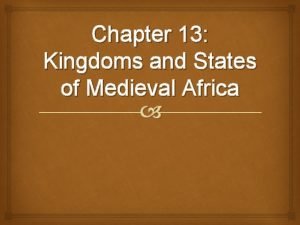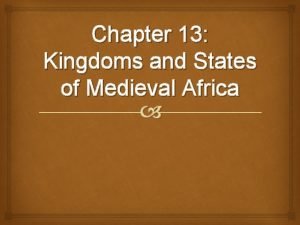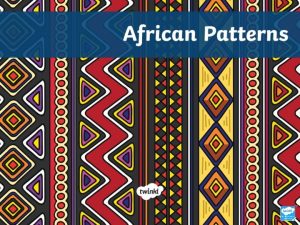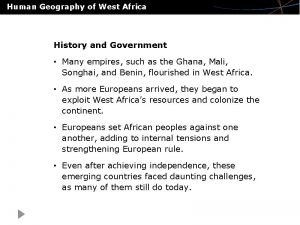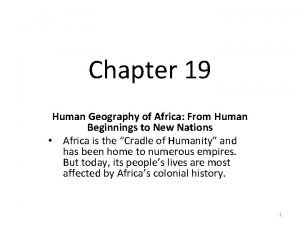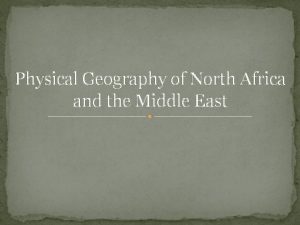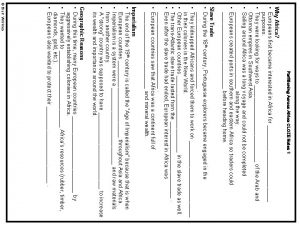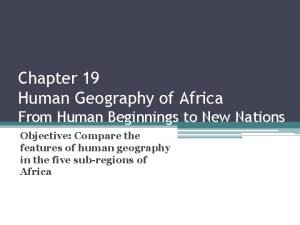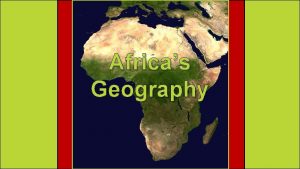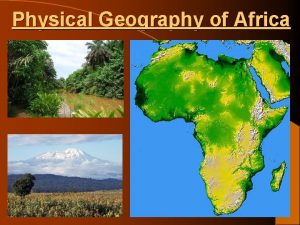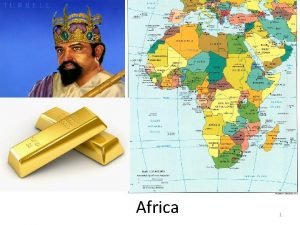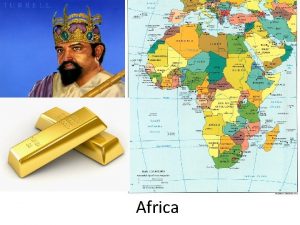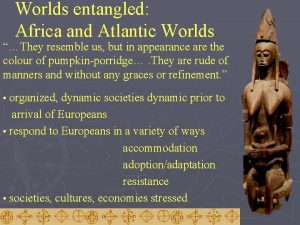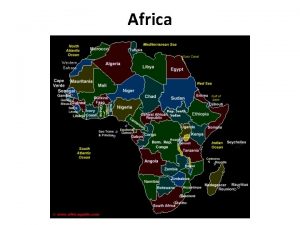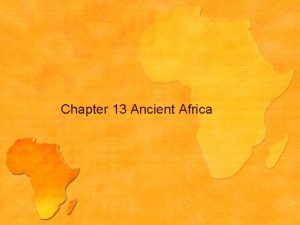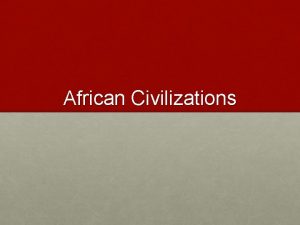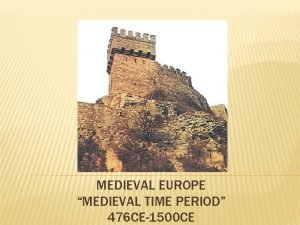MEDIEVAL AFRICA GEOGRAPHY Africa is the worlds second
























































- Slides: 56

MEDIEVAL AFRICA

GEOGRAPHY Africa is the world’s second largest continent.

Savannas cover the largest area of Africa.

North and south of the savannas are deserts. Sahara to the north and the Kalahari in the south. These large seas of sand, blocked trade for many years.

The Sahara is the world’s largest desert.

Almost all of Africa, except for the coastal plains, rests on a plateau. A plateau is an area of high land.

The Niger River runs through West Africa and gave rise to several civilizations. The Nile and Niger Rivers both had civilizations grow up along their banks.

The rich soil along the Niger River grows many crops and gave rise to several civilizations. The Niger River also helped unite the region as merchants and travelers spread good and ideas up and down the river.


QUESTION Why is the Niger River important?

AFRICAN TRADING EMPIRES The Bantu were early Africans who moved throughout the continent. The Sahara desert prevented them from moving into North Africa.

BERBERS Around 400 B. C. North Africans known as Berbers moved across the Sahara and into West Africa. The Berbers transported goods across the hot desert, thus opening trade routes.

THE EMPIRE OF GHANA

GHANA Traders in caravans brought salt and cloth to West Africa for gold and ivory.

GHANA When I say Ghana you say Gold!

GHANA The first empire to arise in West Africa was Ghana rose to power in 400 A. D. Ghana was located on a major trade route and was rich with gold, but had no salt to preserve their food.

TIMELINE Prophet Muhammad born Roman Empire divided into two 300 A. D. 400 A. D. Ghana rises to power 570 A. D.

GHANA Trading gold for salt made Ghana very wealthy. Ghana was also powerful because of its big army with iron weapons.

GHANA Ghana’s power eventually declined as new gold mines were discovered outside the empire. In addition, heavy farming robbed the soil of minerals and made it harder to grow crops.

GHANA Government of Ghana The king ruled with absolute authority over all the provinces.


QUESTION What two items were traded in Ghana? Why was Ghana so powerful?

MALI In the 1200’s, the kingdom of Mali conquered Ghana.

MALI West African griots or storytellers give credit to the great warrior-king named Sundiata Keita “Lion Prince” for capturing Ghana in 1240.

He also conquered the city of Timbuktu, making Mali’s empire even larger than Ghana’s.

MALI Mali’s greatest king was Mansa Musa. He led a huge pilgrimage to Mecca that helped put West Africa on the map.

MALI Mali decreased in power after the death of Mansa Musa.


QUESTION Which great warrior king seized Ghana? (Sunidata Keita or Mansa Musa)

SONGHAI In 1468, Sunni Ali, leader of the Songhai, conquered Timbuktu and drove out the Berbers by controlling economic resources. By the time of his death, Sunni Ali had built the largest empire in West Africa.

SONGHAI In 1591, a small army from Morocco crossed the Sahara armed with cannons and guns easily cut down Songhai soldiers armed with swords, spears, and bows. Within months, Songhai’s empire was gone.


QUESTION Which ruler of Songhai helped build the largest empire in West Africa?

GHANA MALI SONGHAI

TRADITIONAL AFRICAN RELIGION Many traditional African religions were similar to Christianity, Judaism, and Islam. How?

One supreme god

TRADITIONAL MUSLIM CHRISTIAN

ISLAM Ibn Buttuta was a Muslim lawyer from Morocco. He traveled through out the Muslim world for 30 years. When he got to Africa Islam had been there for hundreds of years, but not everyone accepted Islam. He was amazed that West Africans studied the Quran.

ISLAM The great Muslim Mali king, Mansa Musa, allowed people to practice their own religion, but was devoted to making Islam stronger. Mansa Musa

ISLAM In 1324, Mansa Musa made his famous pilgrimage to Mecca and thus brought attention to the kingdom of Mali. While in Mecca, Mansa Musa convinced some of Islam’s finest architects, teachers, and writers to accompany him back to Mali. He brought: Thousands of people, 100 pack camels carrying gold,

ISLAM Islam also influenced African art and buildings.

ISLAM’S IMPACT • Africans who accepted Islam also accepted Islamic laws and ideas.

ISLAM’S IMPACT • Islam also advanced learning with the creation of Muslim schools.

ISLAM’S IMPACT • The Arabic language quickly spread across the continent. • It also influenced art and buildings (mosques and palaces.

AFRICAN CULTURE

“We are almost a nation of dancers, musicians, and poets. ”

Enslaved Africans developed rich cultures that influenced many other cultures, including their own.

AFRICAN ART Cave paintings are the earliest form of African art we know about.

AFRICAN ART Woodcarvers made masks and statues to celebrate African religious beliefs.

AFRICAN ART Kente cloth of West Africa

AFRICAN MUSIC AND DANCE Drums, horns, flutes, or banjos were used to keep the beat.

AFRICAN MUSIC AND DANCE Africans believed that dance allowed spirits to express to themselves.

AFRICAN MUSIC AND DANCE They used dance to celebrate important events such as birth and death. Individual dancers leaped and twirled while drummers sounded in the background/

AFRICAN MUSIC AND DANCE African slaves used music to remember their homeland.

AFRICAN MUSIC AND DANCE Many types of music came out of their hard times and hopes for freedom. Blues, gospel, ragtime, jazz, rock and roll, and rap all came from Africa.

AFRICAN STORYTELLING African storytellers passed down their stories to younger generations. African griots also told their stories
 Medieval africa geography
Medieval africa geography Lesson quiz 13-1 kingdoms and states of medieval africa
Lesson quiz 13-1 kingdoms and states of medieval africa Slides
Slides Chapter 13 kingdoms and states of medieval africa
Chapter 13 kingdoms and states of medieval africa Lesson 2 kingdoms and states of africa
Lesson 2 kingdoms and states of africa Medieval japan geography
Medieval japan geography 27 miles per gallon into kilometers per liter
27 miles per gallon into kilometers per liter What pattern
What pattern Edge city ap human geography
Edge city ap human geography Africa geography unit test study guide
Africa geography unit test study guide Africa geography unit test study guide
Africa geography unit test study guide Human geography of west africa
Human geography of west africa Cultural geography of africa
Cultural geography of africa The mutapa empire thrived on the trade of diamonds.
The mutapa empire thrived on the trade of diamonds. North africa physical geography
North africa physical geography Physical geography of west africa
Physical geography of west africa Chapter 15 lesson 1 physical geography of north africa
Chapter 15 lesson 1 physical geography of north africa 5 themes of geography africa
5 themes of geography africa European partitioning across africa answer key
European partitioning across africa answer key Chapter 19 human geography of africa
Chapter 19 human geography of africa Africa geography webquest
Africa geography webquest Map key
Map key Kums definition geography
Kums definition geography How to write an frq for ap human geography
How to write an frq for ap human geography 5 themes of geography ap human geography
5 themes of geography ap human geography Stateless nation
Stateless nation Phản ứng thế ankan
Phản ứng thế ankan Môn thể thao bắt đầu bằng chữ đua
Môn thể thao bắt đầu bằng chữ đua Khi nào hổ mẹ dạy hổ con săn mồi
Khi nào hổ mẹ dạy hổ con săn mồi điện thế nghỉ
điện thế nghỉ Biện pháp chống mỏi cơ
Biện pháp chống mỏi cơ Một số thể thơ truyền thống
Một số thể thơ truyền thống Trời xanh đây là của chúng ta thể thơ
Trời xanh đây là của chúng ta thể thơ Ng-html
Ng-html Gấu đi như thế nào
Gấu đi như thế nào Thiếu nhi thế giới liên hoan
Thiếu nhi thế giới liên hoan Số.nguyên tố
Số.nguyên tố Phối cảnh
Phối cảnh Các châu lục và đại dương trên thế giới
Các châu lục và đại dương trên thế giới Thế nào là hệ số cao nhất
Thế nào là hệ số cao nhất Sơ đồ cơ thể người
Sơ đồ cơ thể người Tư thế ngồi viết
Tư thế ngồi viết đặc điểm cơ thể của người tối cổ
đặc điểm cơ thể của người tối cổ Cách giải mật thư tọa độ
Cách giải mật thư tọa độ Bổ thể
Bổ thể Chụp tư thế worms-breton
Chụp tư thế worms-breton ưu thế lai là gì
ưu thế lai là gì Tư thế ngồi viết
Tư thế ngồi viết Thẻ vin
Thẻ vin Thơ thất ngôn tứ tuyệt đường luật
Thơ thất ngôn tứ tuyệt đường luật Cái miệng nó xinh thế
Cái miệng nó xinh thế Các châu lục và đại dương trên thế giới
Các châu lục và đại dương trên thế giới Từ ngữ thể hiện lòng nhân hậu
Từ ngữ thể hiện lòng nhân hậu Diễn thế sinh thái là
Diễn thế sinh thái là V cc cc
V cc cc Làm thế nào để 102-1=99
Làm thế nào để 102-1=99 Chúa sống lại
Chúa sống lại

